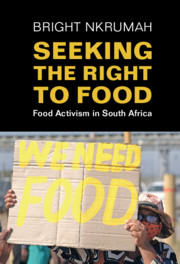Seeking the Right to Food
Despite a constitutional right to food, a comprehensive social security structure, being a net exporter of agricultural products and maintaining a rising GDP, freedom from hunger remains a pipedream for millions of South Africans. With a constant surge in food prices, the availability of sustenance is often seriously threatened for all of South Africa’s population. While the underprivileged majority residing in townships often demonstrate their discontent for poor service delivery on the streets, they rarely channel this strategy into taming food inflation. This study seeks to understand this irony and examine ways in which this trend could be reversed. Proposing a compelling argument for food activism, Bright Nkrumah suggests ways of mobilising disempowered groups to reclaim this inherent right. Presented alongside historical and contemporary case studies to illustrate the dynamics of collective action and food security in South Africa, he draws from legal, social and political theory to make the case for ‘activism’ as a force for alleviating food insecurity. This title is also available as Open Access on Cambridge Core.
Bright Nkrumah is affiliated with the Global Change Institute at the University of the Witwatersrand. He received his DPhil from the Center for Human Rights, University of Pretoria and has published extensively on political contestation, minority rights, food (in)security, urban agriculture and democratisation.



